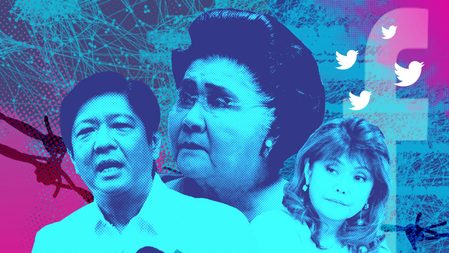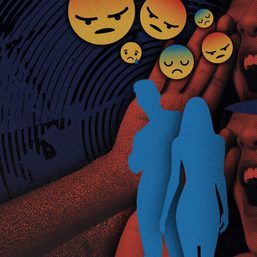SUMMARY
This is AI generated summarization, which may have errors. For context, always refer to the full article.

MANILA, Philippines – While Filipinos are spending more time online during the pandemic, news organizations continue to be attacked, and have been overtaken by other information sources in terms of reach on social media.
Meanwhile, the government and politicians have gained more on the digital space. They enjoy blind trust from some Filipino audiences, even as the involvement of Philippine state actors in disinformation campaigns has been exposed.
These are some of the findings of the Rappler Research Team’s “Patient Zero: A study on the Philippine Information Ecosystem” released on Thursday, February 17. The report details how the digital space in the Philippines has evolved and made Filipinos more vulnerable to manipulation.
The study, conducted with support from Internews and which employed Internews’ Information Ecosystem Assessment methodology, sought to explore the dynamics of the Philippine media environment and how information and disinformation flow through it.
In particular, Rappler explored cascades around themes that were dominant during the Duterte administration, namely the war on drugs, attacks against the press, and messaging around Martial Law and authoritarian rule.
Here is a summary of the study’s findings:
- Filipinos’ exposure to the internet increased due to the pandemic. Majority said they’ve been spending over four hours a day on social media since the pandemic began.
- At least 1 in every 3 Filipino internet users is new to digital media and are thus vulnerable to disinformation and online manipulation techniques. Some respondents said that they look at comments to gauge the veracity of information in the post.
- While media organizations remain at the top in terms of social media following, they no longer dominate the information ecosystem.
- Trustworthiness is the primary consideration in following social media groups, pages, and channels, but other major considerations are entertainment value and agreeableness. This poses a risk, as social media channels labeled as entertainment channels were found to have shifted their focus to hyper-partisan content, with some including disinformation.
- Majority of survey respondents said they could tell real news from fake news, but focus group discussions revealed that some still believed false claims that had already been fact-checked. These debunked claims included those around Martial Law, ABS-CBN’s alleged violations, and the drug war.
- Similarities were found between disinformation in the Philippines and the “Firehose of Falsehood” Russian propaganda model, which is characterized as high volume and multi-channel, rapid, continuous, and repetitive, lacking in commitment to objective reality, and lacking in commitment to consistency. This was observed especially in the case of revisionist narratives on Martial Law and the Marcos achievements, and messaging on attacks against the press and support for the drug war.
- Pervasive metanarratives against mainstream media leads audiences to follow hyper-partisan social media influencers as “alternative” sources of information. Media are often accused of “hiding the truth” and refusing to report on supposed accomplishments of the Duterte administration and the Marcos regime.
- The government and politicians have gained exposure in social media due to platforms boosting their channels for content related to COVID-19. Some expressed that they trusted information so long as it came from official sources – a dangerous mindset, given that Philippine state actors have previously been found to be behind a number of disinformation cascades.
- Platforms’ incoherent policies, neglect, and focus on engagement allows disinformation to thrive and diminishes the reach of news media. Measures to manage the sharing of all COVID-19 stories, in an attempt to counter misinformation, ended up affecting the reach of news coverage during the pandemic. This included stories related to concerns about the government’s inefficiencies in pandemic response, and issues on its use of public funds. This made it more difficult for news organizations to provide checks and balances to government messaging on social media.
Following these findings, Rappler listed recommendations for different sectors to help maintain the integrity of the 2022 elections and to counter disinformation:
- To address attacks against the Philippine press, groups should promote and amplify credible news sources and support public interest journalism.
- Ahead of the 2022 elections, the Commission on Elections and election watchdog groups should promote election integrity and enforce transparency and accountability. This involves more regulation on social media campaigns.
- Treat disinformation as a form of electoral fraud, and call out candidates who employ disinformation tactics for their benefit.
- Institutions and advocacy groups should address how their algorithms amplify disinformation and hate.
- Media should hold candidates accountable for disinformation they perpetuate and propaganda that benefits them, and prioritize disinformation as an election issue.
Read the full report here. – Rappler.com
Add a comment
How does this make you feel?






![[ANALYSIS] Cybermisogyny violates human rights](https://www.rappler.com/tachyon/2022/06/Cyber-misogyny-human-rights.jpeg?resize=257%2C257&crop_strategy=attention)
![[ANALYSIS] Building Narratives: stories of greatness and windmills in Marcos Jr.’s campaign video](https://www.rappler.com/tachyon/2022/05/Narratives-marcos-windmills-May-18-2022.jpg?resize=257%2C257&crop_strategy=attention)




![[OPINION] You don’t always need a journalism degree to be a journalist](https://www.rappler.com/tachyon/2024/06/jed-harme-fellowship-essay-june-19-2024.jpg?resize=257%2C257&crop=287px%2C0px%2C720px%2C720px)
![[OPINYON] Tungkol sa naging viral na social media conjecture](https://www.rappler.com/tachyon/2024/07/thought-leaders-conjecture-07262024.jpg?resize=257%2C257&crop_strategy=attention)
![[DECODED] The Philippines and Brazil have a lot in common. Online toxicity is one.](https://www.rappler.com/tachyon/2024/07/misogyny-tech-carousel-revised-decoded-july-2024.jpg?resize=257%2C257&crop_strategy=attention)



There are no comments yet. Add your comment to start the conversation.